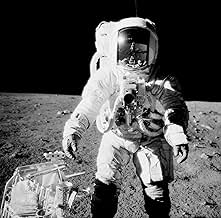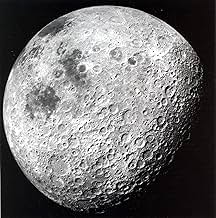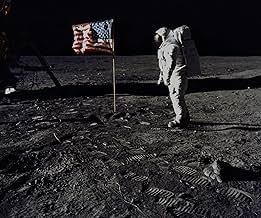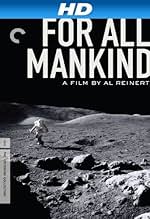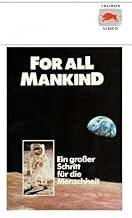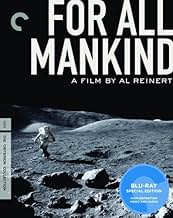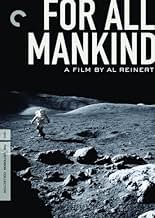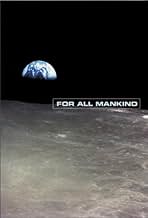NOTE IMDb
8,1/10
6,9 k
MA NOTE
Un regard en profondeur sur diverses missions d'alunissage de la NASA.Un regard en profondeur sur diverses missions d'alunissage de la NASA.Un regard en profondeur sur diverses missions d'alunissage de la NASA.
- Nommé pour 1 Oscar
- 3 victoires et 3 nominations au total
Jim Lovell
- Narrator - Apollo 8, Apollo 13
- (voix)
- (as James A. Lovell Jr.)
Ken Mattingly
- Narrator - Apollo 16
- (voix)
- (as T. Kenneth Mattingly II)
Russell Schweickart
- Narrator - Apollo 9
- (voix)
- (as Russell L. Schweickart)
Eugene Cernan
- Narrator - Apollo 10, Apollo 17
- (voix)
- (as Eugene A. Cernan)
Charles Conrad
- Narrator - Apollo 12
- (voix)
- (as Charles P. Conrad Jr.)
Richard Gordon
- Narrator - Apollo 12
- (voix)
- (as Richard F. Gordon Jr.)
Alan Bean
- Narrator - Apollo 12
- (voix)
- (as Alan L. Bean)
Jack Swigert
- Narrator - Apollo 13
- (voix)
- (as John L. Swigert Jr.)
Stuart Roosa
- Narrator - Apollo 14
- (voix)
- (as Stuart A. Roosa)
James Irwin
- Narrator - Apollo 15
- (voix)
- (as James B. Irwin)
Charles Duke
- Narrator - Apollo 16
- (voix)
- (as Charles M. Duke Jr.)
Harrison Schmitt
- Narrator - Apollo 17
- (voix)
- (as Harrison H. Schmitt)
Buzz Aldrin
- Self
- (images d'archives)
Bill Anders
- Self
- (images d'archives)
Neil Armstrong
- Self
- (images d'archives)
Stephen Bales
- Self
- (images d'archives)
- (as Steve Bales)
Frank Borman
- Self
- (images d'archives)
Avis à la une
Great footage, but the missions are all over the place without really telling us. If you don't have a little knowledge beforhand, like Apollo 13, you're pretty much left in the dark which mission is which and may think it was just 1 mission to the moon (and back obviously). Started to really dawn on me when Apollo 13 had that breathing problem (which was solved in a jiffy in this documentary) and then a crew was going for a moonlanding ( which obviously Appolo 13 never did. But hey when you hear the name Neil Armstrong you are pretty much back on course. Ah okay great i am seeings Apollo 11 and the first moonlanding at the moment : )
Footage: 8.5 Overall Docu : 6.
Footage: 8.5 Overall Docu : 6.
Most of this NASA footage is not what you've been able to see on the news but footage that shows more of the humanity and introspective moments that happen in the midst of the spectacular. Extended moments of them approaching the moon before the Eagle lands and the astronauts describing what it's like walking on the moon and as they explore and try to take a moment stop and simply ponder being on the Moon. A must see for any space fan.
I've been a fan of Brian Eno's work for years, and have cherished the album entitled "Apollo: Atmospheres and Soundtracks." The album is the commissioned soundtrack for this compilation documentary of the NASA Apollo missions. What a harmony of the arts this is. The stark NASA footage coupled with the hauntingly soothing score create a fascinating marriage of techniques and styles. Although the music editor overused certain tracks over others, the subtlety of Eno's music prevents it from becoming repetitive. A pleasure to watch.
This was effective for this viewer. Usually what that means in cases like this is that it made me cry.
The hook is that it reviews its subject through the eyes of the astronauts. I was wary of this. I got involved in the program later, during the beginning of the shuttle era and even then the astronauts were pretty much there only to have been taken there. They were chosen some of them for how good they looked on newsprint.
The magic of the program and its heroes were a few visionaries and an army of competent engineers.
Yet it was effective because we see the story through the eyes of witnesses. There role here is simply as witness, and if you were alive during this time, you will be impressed at how it affects you.
There were all sorts of paths that could have been followed in this. The quest of man to explore; the mysteries of the unknown; the vast game being played by two enemies to demonstrate superiority of ideology; the hidden weapons programs.
They cover all these slightly except that last, and that's excusable because these witnesses saw none of that. But the story that dominates is the Kennedy one. Its hard to imagine today, but we loved our president and he deserved it. He was intelligent and articulate. His advisers came off not as louts or bullies, but men (and a few women) smart enough for difficult times. He was the Peace Corps president.
Kennedy promised to go to the moon and return without consulting anyone at NASA, and riding on the crest of a national enthusiasm for science and hardware. The nation really was engaged. And then he was killed, and with our rising self-doubt (Vietnam, race) we decided that as a people we owed it to him, or what he stood for. So when it happened, and the world watched, re affirmed the man and what he stood for. It was a good feeling, not pride as much as wonder about who we discovered ourselves to be.
This will evoke that same feeling again, the original tears, followed by tears of disappointment at the massive collapse of esteem which followed. A serious of botched opportunities to be worthy of the accomplishment.
Its an effective documentary in that regard, all the more so since everything was designed to be photographed, and was. If you really want to learn of this program, you need to go elsewhere, But this delivers on the promise.
Ted's Evaluation -- 3 of 3: Worth watching.
The hook is that it reviews its subject through the eyes of the astronauts. I was wary of this. I got involved in the program later, during the beginning of the shuttle era and even then the astronauts were pretty much there only to have been taken there. They were chosen some of them for how good they looked on newsprint.
The magic of the program and its heroes were a few visionaries and an army of competent engineers.
Yet it was effective because we see the story through the eyes of witnesses. There role here is simply as witness, and if you were alive during this time, you will be impressed at how it affects you.
There were all sorts of paths that could have been followed in this. The quest of man to explore; the mysteries of the unknown; the vast game being played by two enemies to demonstrate superiority of ideology; the hidden weapons programs.
They cover all these slightly except that last, and that's excusable because these witnesses saw none of that. But the story that dominates is the Kennedy one. Its hard to imagine today, but we loved our president and he deserved it. He was intelligent and articulate. His advisers came off not as louts or bullies, but men (and a few women) smart enough for difficult times. He was the Peace Corps president.
Kennedy promised to go to the moon and return without consulting anyone at NASA, and riding on the crest of a national enthusiasm for science and hardware. The nation really was engaged. And then he was killed, and with our rising self-doubt (Vietnam, race) we decided that as a people we owed it to him, or what he stood for. So when it happened, and the world watched, re affirmed the man and what he stood for. It was a good feeling, not pride as much as wonder about who we discovered ourselves to be.
This will evoke that same feeling again, the original tears, followed by tears of disappointment at the massive collapse of esteem which followed. A serious of botched opportunities to be worthy of the accomplishment.
Its an effective documentary in that regard, all the more so since everything was designed to be photographed, and was. If you really want to learn of this program, you need to go elsewhere, But this delivers on the promise.
Ted's Evaluation -- 3 of 3: Worth watching.
In a project almost more ambitious than the Apollo program itself, Al Reinert distills six million feet of NASA film footage and over 80 hours of taped interviews into a glorious 90- minute flashback to the ultimate achievement of our time: the manned exploration of another world. The film condenses all ten Apollo moon shots into a single flight, using only the genuine sights, sounds, and impressions experienced by the astronauts themselves along the way, from the tension and exhilaration of lift off to the joy (and inconvenience) of zero gravity, and from the loneliness of deep space to the wonder of stepping foot on an alien world. Seeing the footage for the first time on a big screen can be a revelation; it's a thrilling, vicarious journey across a new threshold in human evolution, providing both an argument for the continued human exploration of the cosmos and a timely reminder of how precious life on our own planet is.
Le saviez-vous
- AnecdotesThe staging footage was captured because NASA wanted to document the flight process of an unmanned Saturn flight for feedback in case there was a failure for engineers to look at footage to see what went wrong. Cameras were mounted in strategic locations, kicking on at critical moments to document the staging process for less than half a minute. After completion, the light-tight canisters containing the exposed film were jettisoned, dropping to earth with homing beacons and parachutes inside protective heat shields. Air Force C-130 transport planes, towing gigantic nets, recovered the canisters in the southern Atlantic Ocean.
- GaffesThe opening of the documentary incorrectly states that: "During the four year between December 1968 and November 1972, there were nine manned flights to the moon." The last lunar mission, Apollo 17, took place in December 1972.
- Citations
Charles M. Duke Jr.: The only bad part about zero gravity in Apollo was goin' to the bathroom. We had a very crude system. For your feces it was a bag, and you put this bag in the right position. So you go, but the only thing is that nothing goes to the bottom of the bag in zero gravity.
- Crédits fousFilmed on location by the United States National Aeronautics and Space Administration.
- Bandes originalesSirens
Courtesy of Opal Records (Music For Films III)
Written and Performed by Daniel Lanois and Brian Eno
Licensed by Upala Music/Hamstein (BMI)
Meilleurs choix
Connectez-vous pour évaluer et suivre la liste de favoris afin de recevoir des recommandations personnalisées
- How long is For All Mankind?Alimenté par Alexa
Détails
- Date de sortie
- Pays d’origine
- Langue
- Aussi connu sous le nom de
- National Geographic: For All Mankind
- Lieux de tournage
- Sea of Tranquility, The Moon, Space(Apollo 11 landing site)
- Sociétés de production
- Voir plus de crédits d'entreprise sur IMDbPro
Box-office
- Montant brut aux États-Unis et au Canada
- 770 132 $US
- Week-end de sortie aux États-Unis et au Canada
- 33 777 $US
- 5 nov. 1989
- Montant brut mondial
- 770 366 $US
- Durée1 heure 20 minutes
- Couleur
- Mixage
- Rapport de forme
- 1.37 : 1
Contribuer à cette page
Suggérer une modification ou ajouter du contenu manquant

Lacune principale
By what name was For All Mankind (1989) officially released in India in English?
Répondre


